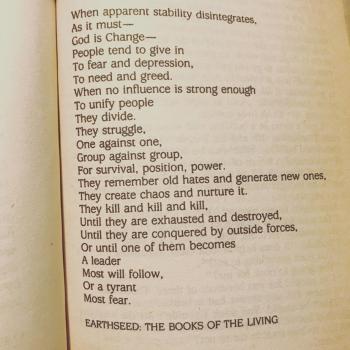There was a lot of God-talk in the episode of Fringe “The Consultant.” Discussing a case which (like almost all of them on Fringe) involved someone dying under unusual circumstances, the subject comes up whether God killed the man in question, as Walter quotes from Romans 1. Walter adds that some would say that God kills all of us – although usually in a less violent manner.
 There is also a reference to there being no miracles in the sense of miraculous recoveries from illness, and we found out in this episode why Col. Broyles in the other universe was working for David Robert Jones: Jones was providing Broyles with medicine to save his son, who would otherwise have been suffering in pain. Interestingly, in the earlier timeline, Broyles’ son was kidnapped and experienced side effects from a procedure that robbed him of his youth. Whether we are supposed to connect the two is unclear. Perhaps what Jones is treating him for is the effects of what was done to him in that earlier episode, or perhaps things have unfolded differently since time was rewritten and in this new timeline Christopher, Philip Broyles’ son, suffers from some sort of illness.
There is also a reference to there being no miracles in the sense of miraculous recoveries from illness, and we found out in this episode why Col. Broyles in the other universe was working for David Robert Jones: Jones was providing Broyles with medicine to save his son, who would otherwise have been suffering in pain. Interestingly, in the earlier timeline, Broyles’ son was kidnapped and experienced side effects from a procedure that robbed him of his youth. Whether we are supposed to connect the two is unclear. Perhaps what Jones is treating him for is the effects of what was done to him in that earlier episode, or perhaps things have unfolded differently since time was rewritten and in this new timeline Christopher, Philip Broyles’ son, suffers from some sort of illness.
Either way, there are several ethical and also religious connections one can see in this plot element. First, there is the withholding of access to medical care in order to manipulate people, something that ought to discuss the lack of free and universal access to medical care in many societies today, including the United States. Second, there is a comparison to be made between Broyles’ decision to turn himself in at the end of the episode, and the character of Abraham in the Bible. Broyles’ action would cause his son pain and presumably ultimately cost his son’s life. Abraham offered his son to the seemingly arbitrary whim of a deity as conceived by ancient near eastern people. Broyles put his son’s life on the altar, as it were, to save universes. There is also the seeming ability of technology to provide “miracles” which religious faith does not, and certainly not as consistently. There’s a lot to talk about in this episode as pertains to religion.
.jpg)












